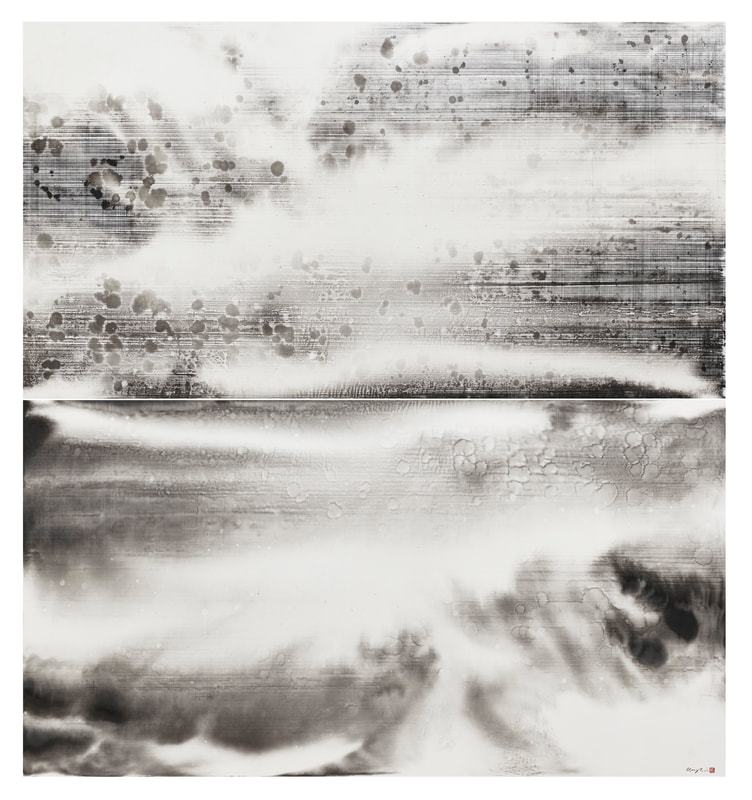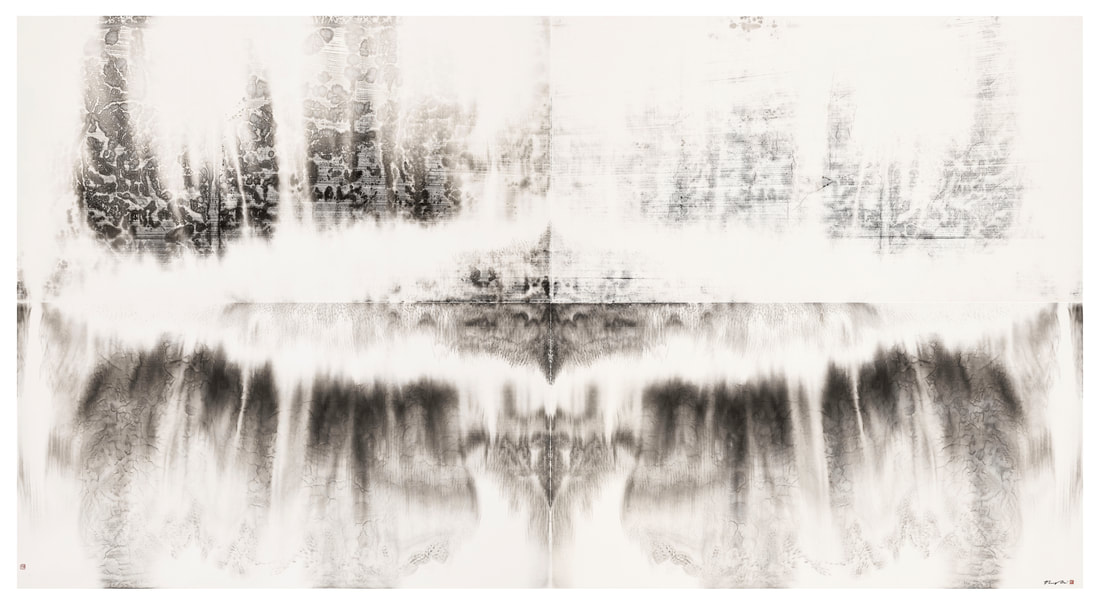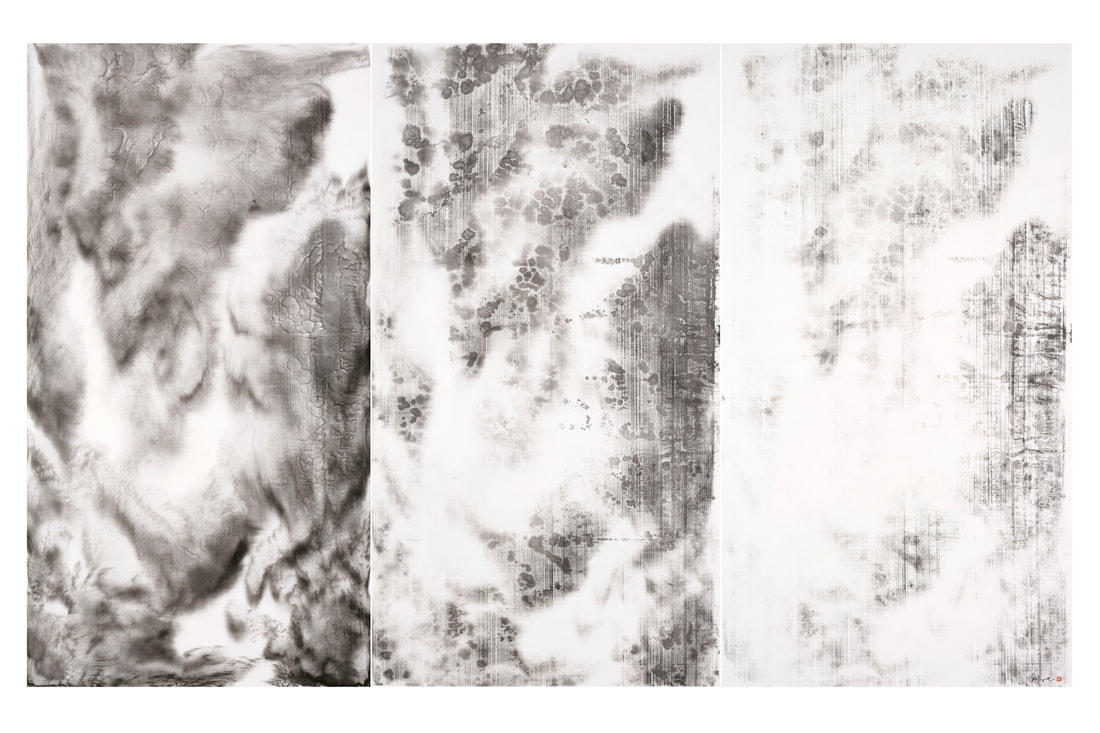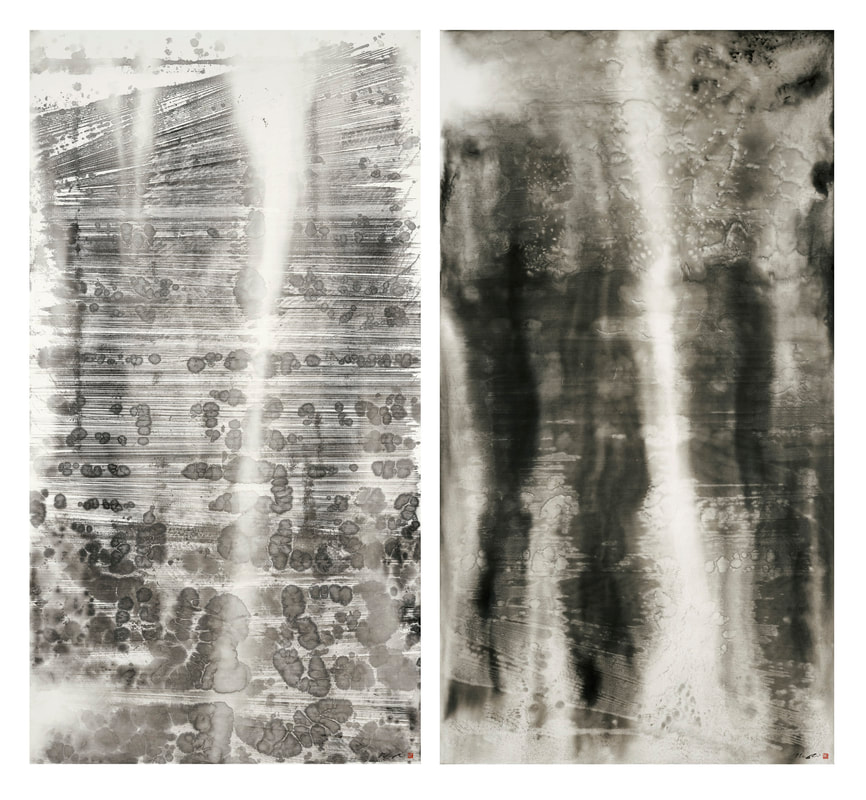痕 Traces
《痕》之四
繪畫的過程始於左幅。墨沿著筆落下,在濕透的紙上流淌,與水互相沖刷,緩緩地形成一道道流動、滲化的痕跡。畫面中間露出無墨的蒼白之處猶如茫然的記憶。水是為載體,讓墨痕伴隨記憶被儲存於濕透的紙張疊層之中。
接著,熊輝蓋上兩張乾燥的白紙覆蓋畫面,並輕輕撫平,觸碰之處隨即冒出斑斑墨跡。他用一支無墨的硬筆沿著鐵尺縱橫劃下透明的直線,那些線無色,卻遺下了物理壓痕。筆尖所到之處,紙的表層猶如被劃破般滲出疊層下的墨痕。無色的線交織成透明的網覆蓋整張白紙,被隱沒的痕跡在劃痕裏重新浮現,並與新的印痕互相纏繞、轉化、交疊。
最後紙張疊層被翻開,從左至右的排序展示底至面層。透明的網以不同狀態貫穿其中。在左屏裏的墨跡隨著記憶,經行行劃痕被借去、轉移到位於右屏的面層。紙上保留了消失的痕跡,像一道微微泛光的網覆蓋其上。在右屏浮現的墨痕和記憶,如一道班駁的網,編織著消散與新顯現的痕跡。作品紀錄了水與痕跡和記憶之間轉化的過程和關係。
Traces IV
The making of this triptych began from the left panel. Ink dripped down the pen, trailed in the soaked paper, pushed and scrapped against the water, forming slowly in rivulets traces of its flow and diffusion. A void exposed across the composition elicited dazed memory. Water is deemed as a carrier, whereby traces of ink together with memories are stored within the stacks of soaked paper.
Hung Fai then laid two sheets of dry, blank paper over the surface, smoothened them by tapping gently on the top. Upon every touch, there emerged flecks or puddles of ink. Afterwards, with a metal ruler, Hung used an inkless pen to inscribe straight lines on the paper in horizontal or vertical manners. Albeit colourless, the lines carved tracks where the sunken ink marks leaked and burst as if the surface had been slashed open. They interwove into a transparent net that shrouded the paper, and through which what had been concealed was retrieved, then intertwined, transformed and overlapped with the myriad of new marks.
Lastly, the layers of paper were spread out into three panels, from left to right revealing from the lowest to the top layer, connected by the transparent net existing in various forms. Along with memories, the ink marks from the left panel was “borrowed” and lifted to the right. The disappeared traces was captured on the paper as if seized by an overlaying, shimmering net. The ink marks and memories transferred to the right panel took form of a flecked net which has interwoven both the disappearing and newly formed traces. The entire work recorded the transformation and relationships of water, traces and memories.
《痕》之二
雙聯作品《痕》始於右幅。墨沿著筆落下,在濕透的紙上流淌,和水互相沖刷,緩緩地形成一道道如河流般的痕跡,露出蒼白處如茫然的記憶。水是為載體,讓墨痕伴隨記憶被儲存於濕透的紙張疊層之中。
熊輝接著於畫面上蓋以一張白紙並輕輕撫平,觸碰之處隨即冒出斑斑墨跡。然後他用一支無墨的硬筆,沿著鐵尺畫下一行行透明的線。那些線無色,卻遺下了物理壓痕。筆尖所到之處,紙的表層猶如被劃破般滲出疊層下的墨痕,被隱沒的痕跡在行行劃痕中重新浮現,並與新的印痕互相纏繞、轉化、交疊。
最後,紙張疊層被翻開,像鏡象般並置左右,但上下對倒,如映入水中的倒影。
整個繪畫的過程中紀錄了水與痕跡和記憶之間的轉化和關係。
雙聯作品《痕》始於右幅。墨沿著筆落下,在濕透的紙上流淌,和水互相沖刷,緩緩地形成一道道如河流般的痕跡,露出蒼白處如茫然的記憶。水是為載體,讓墨痕伴隨記憶被儲存於濕透的紙張疊層之中。
熊輝接著於畫面上蓋以一張白紙並輕輕撫平,觸碰之處隨即冒出斑斑墨跡。然後他用一支無墨的硬筆,沿著鐵尺畫下一行行透明的線。那些線無色,卻遺下了物理壓痕。筆尖所到之處,紙的表層猶如被劃破般滲出疊層下的墨痕,被隱沒的痕跡在行行劃痕中重新浮現,並與新的印痕互相纏繞、轉化、交疊。
最後,紙張疊層被翻開,像鏡象般並置左右,但上下對倒,如映入水中的倒影。
整個繪畫的過程中紀錄了水與痕跡和記憶之間的轉化和關係。
Traces II
The creation of this diptych begins from the right panel. Ink dripped down the pen, flowed onto the soaked paper, pushed and scrapped against the water, slowly forming passages of traces akin to rivers, where the exposed white space recalls dazed memory. Water is deemed as a carrier, whereby traces of ink embedded with memories are stored within the stacks of soaked paper.
Hung Fai then covered the surface with a blank sheet, smoothened it by tapping gently on the top. Upon every touch, spots or puddles of ink emerged. Afterwards, Hung used a pen which had run out of ink to draw lines along a straight metal ruler. Albeit colourless, the lines were left as physical furrows, where the sunken ink marks leaked and burst as if the surface had been slashed open. Through these incisions what had been concealed was retrieved, and then interwove, transformed and overlapped with the myriad of new marks.
Lastly, the layers of paper were unfolded, placed side by side as in mirror images, with one panel’s orientation inverted resembling reflection in water.
The whole process recorded the transformation and relationships of water, traces and memories.
The creation of this diptych begins from the right panel. Ink dripped down the pen, flowed onto the soaked paper, pushed and scrapped against the water, slowly forming passages of traces akin to rivers, where the exposed white space recalls dazed memory. Water is deemed as a carrier, whereby traces of ink embedded with memories are stored within the stacks of soaked paper.
Hung Fai then covered the surface with a blank sheet, smoothened it by tapping gently on the top. Upon every touch, spots or puddles of ink emerged. Afterwards, Hung used a pen which had run out of ink to draw lines along a straight metal ruler. Albeit colourless, the lines were left as physical furrows, where the sunken ink marks leaked and burst as if the surface had been slashed open. Through these incisions what had been concealed was retrieved, and then interwove, transformed and overlapped with the myriad of new marks.
Lastly, the layers of paper were unfolded, placed side by side as in mirror images, with one panel’s orientation inverted resembling reflection in water.
The whole process recorded the transformation and relationships of water, traces and memories.
Copyright © www.hungfaivito.com | All Rights Reserved |






